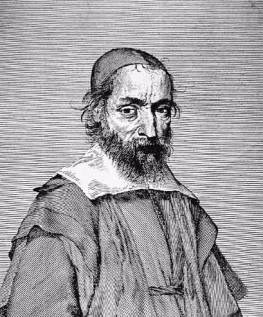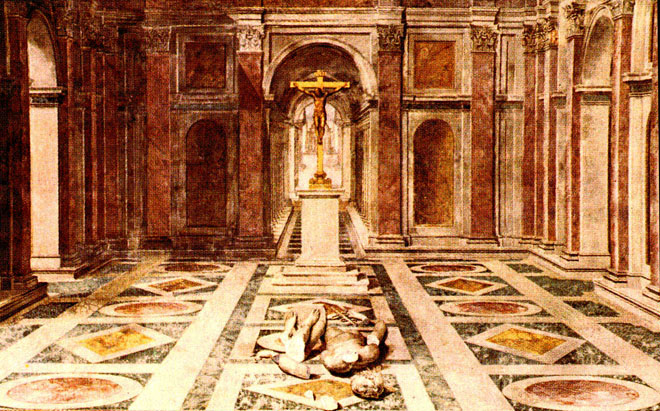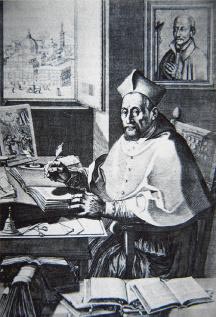Dear Brother/Sister X,
It has come to my attention that you
have been performing studies on the human body and have sought to spread your
ideas generally throughout Christian Europe.
It is said you have chanced upon the writings of a pagan who claimed the
blood circulates through the body by its own motion, as pumped by a bodily
organ, and is not moved principally by the will of God. They say you are writing to others about
your research, observations, and conclusions.
Many have brought to me their objections to your work and writings, as
they have contradicted certain teachings of the Church and gone beyond the
bound of that which is proper to man.
In your pride and vanity, you are putting your soul in danger and the
stability of our Church at risk. This
cannot continue. I write to admonish
you, as befitting one Christian who worries for the eternal soul of another and
esteems the edifice of the Holy Church eternal and triumphant. Beware of the consequences of that which you
do!
Through the many dark, difficult
centuries since the fall of the old Roman Empire the Church has been the rock
upon which Europe has remained tethered: we and our order have survived
invasions by the barbarians from the north and the infidels from the south, as
well as the Viking war parties that have sailed down the rivers in search of
plunder. When men and women were poor,
scared, and hungry, we helped organized them into functioning feudal
communities that protected them and we also provided guidance and succor for
their souls in our teachings. Amid the agitations of the world, the Church
remained unmoved; the waves could not shake her. While around her everything was in a
horrible chaos, she offered to all the shipwrecked a tranquil port where they
could find safety. This we
have done, and nobody else. We kept the
Word of God alive as the cities crumbled and the libraries burned to the
ground; as the darkness of war and destruction reached to the corners of
Europe, we attended to the precarious light of learning and nursed it in remote
monasteries where we patiently and lovingly copied and illustrated parchments. And through the efforts and leadership of
the Church we have over many centuries re-captured in Europe part of the
stability and order of the old Roman Empire; there is more wealth and peace
today in our lands than any of us can ever remember there having been since
Alaric and the Visigoths sacked Rome more than ten centuries ago. This we have done, and nobody else. “Blessed
are the meek, for they shall inherit the earth,” saith the Lord, and with
His favor we are from being a tiny, despised sect in a vast empire come to
bring forth the good news of eternal truth to the many: the Word is made
manifest and reigns triumphant with the help and guidance of the Apostolic See
in these kingdoms we have built in Europe: we are almost all of us Christians
now whose souls travel through the veil of this world towards the bliss of
everlasting life by belief in God, the performance of good works, and obedience
to teachings and rules of the Church.
This that we have done is no small achievement.
But let me return to your case
generally, and in particular that occupation a righteous Christian scholar
brings to the community. The only true
wealth a Christian enjoys is the observation of the Rule: prayer, work and
study. But of our work, the work of the Church, and in particular your
work as a good Christian and a scholar -- indeed the substance of this work! --
is study, and the preservation of knowledge. Preservation and not a
search for truth, because the property of knowledge is a divine thing, in that
it is complete in of as itself and has been defined since the beginning, in the
perfection of the Word which reveals itself to itself. Human history
proceeds in a straight line from the creation in Genesis to the imminent return
of Christ triumphant, who will appear seated on a cloud to judge the quick and
the dead. I am He who is, said the God of the Jews. I am the way,
the truth, and the life, said our Lord. There you have it: knowledge is
nothing but the awed comment on these two truths. Everything else that
has been said was uttered by the prophets and by the evangelists, by the
fathers and doctors of the Church, to make these two sayings clearer. And
sometimes an appropriate comment came also from the pagans, who were ignorant
of them, and their words have been taken into the Christian tradition.
But beyond that there is nothing further to see. There is only to
continue meditation, to gloss, preserve. This is and only this should be
the goal and occupation of the human mind.
There is nothing else.
But you and certain others are
reaching beyond what is fitting to man.
For some time now the serpent of pride has lay coiled in Europe; and you
and the other “humanists” are that serpent’s poison which threatens all we have
worked to build. In your recent studies
of history and ancient learning, you have moved beyond that which is proper to
the righteous Christian community and its sacred mission to work for the
salvation of souls. Writing in the
vulgar vernacular of the cities rather than in the scholarly Latin of the
learned,
you dare to write obscenities that mock the Church and make light of its
works! In the immodest paintings and
sculptures of others which you have praised, and in your own mocking book and
scurrilous poetry, you and these other “humanists” act as tempters and
seducers. You seek to highlight and
make beautiful the ugly sinfulness of fallen humanity rather than bring the
heavenly and the divine down to this unworthy earth. Look at how a painting -- the work of a man, often the image of a
human being -- is worshipped and deified by the ignorant and the vain in the
streets today. You would try to create
graven images that approximate real life -- seeking to usurp the act of
creation which is proper only to the Lord!
But the Lord commands us: “You
shall have no other gods before me. You shall not make for yourself a graven
image, or any likeness of anything that is in heaven above, or that is in the
earth beneath, or that is in the water under the earth; you shall not bow down
to them or serve them; for I the LORD your God am a jealous God, visiting the
iniquity of the fathers upon the children to the third and the fourth
generation of those who hate me, but showing steadfast love to thousands of
those who love me and keep my commandments.” You also praise the construction of public buildings and their
adornment with artifacts whose genius does only attest to overweening pride and
vanity. As in the Tower of Babel, you
would seek to know beyond what God has deemed proper! Sinners who would reach towards heaven! Men who would be gods!
You would bring His wrath down upon all of us! “And now nothing will be
restrained from them which they have imagined to do.” It is also written, “For the imagination of man’s heart is evil from his youth.”
I apologize for my anger, but you have given me reason. Anger is found in
the divine character, as it is always found in any strong human character.
God seeks our salvation through the covenant He made with man. His wrath
comes upon us when the conditions under which He alone can work out that
salvation are infringed, and His purpose of mercy is imperiled.
Sir, your lust for knowledge, as
evidenced in your research of pagan texts and study of the human corpus and
public opinions on books and art, and in the fame you think it brings you, is
no different than another’s mortal sin in lusting after the flesh or yearning
for earthly riches. A lust for
knowledge and learning is, after all, still a lust which leads one to wander
from the light of righteous belief, obedience, and salvation towards the
darkness of sin and death. Be under no
illusions: the earthly City of Man in the guise of the Roman Empire collapsed
precisely because it was founded on the immaterial shadows of this transient
world and not on the Truth of His Eternal Kingdom which lasts forever! Power, glory, vanity, pride, lust, ambition
-- for all of these sins God suffered the pagans to be vanquished by us
Christians! Now you would look back to
these pagans and bring back their corrupt world of vice, vexation, and error!
A new age of darkness and misery will be the result, sooner or later. You
seek knowledge as others, more pure in heart, seek faith. You are in
error, having strayed from the path of righteousness. To believe
oneself, as children do, to be the center of all things is childish; but to
presume to be able to comprehend by human reason the entirety of God and His
creations is to be not only childish but dangerous.
The
doctrine of a true Christian does not originate from the elaborate disquisitions
of intellectuals, nor do they follow, as many in the past did, philosophical
systems which are the fruit of human thinking. A true Christian desires to
know God and the soul. Nothing more? Nothing whatever. "They are in the flesh, but do not live according to the
flesh," says the Bible. In the way
we Christians are in the world, so the soul is in the body; as the soul lives in
the body but is not of the body, so we live in the world but are not of the
world. What makes the heart of a righteous Christian heavy? The
fact that he is a pilgrim, and longs for his country, the Kingdom of God.
We dwell on earth, but are citizens of
heaven. We live amidst the natural
sin and filth of this corrupted world, awaiting the perfection and
incorruptibility of heaven. Why then devote a life to writing books of
childish verse and satires? Why study
the flesh and the stars, when they mean nothing? Give
up your school of Satan. The Cherubim and Seraphim desired to raise themselves
unto the level of God, and they were thrown down from heaven to burn forever in
the fiery lakes of hell by Him.
There are limits beyond which God
does not smile but punishes. The Lord
punishes and continues to punish such pride that does not humble itself, and
the Lord has no difficulty in finding, always and still, thanks to our
fragility, the instruments of His vengeance.
You who seek to know God’s secrets in the body and substances of the
earth!
You who are puffed up, and are
not in the place God has accorded you!
Beware of what knowledge you might unearth, that you might awaken
ravenous monsters over whom you have no control! Break not the rightful bounds of knowledge God and the Church
have erected and drink not from impure, dangerous springs: the ways and lures
of the Evil One are many, and legion is the error committed by sinful, weak mankind in
the name of truth and searching for the truth.
Presumptuous sinner that you are, make not so much study and care of
this vile bit of dust and mud where you today and tomorrow live out your death
but focus rather your energies and reflection on the eternal life which awaits
you with your Heavenly Father. This is
the proper Christian ethic with which to live, work, and die, as all else is
tumult and confusion; and you shall be judged, make no doubt about it -- all
else is vanity and a vexation of spirit from which nothing good will
emerge. What gain you to earn fame and
glory in this world, if you lose your soul in the next? We the wise who are called upon to serve as
the Lord’s earthly shepherds must in the eyes of the simple remain shining
examples. We must be beyond reproach,
both in our theology and in our lives; we must be correct in belief as well as
in action.
The Church has not been ignorant of
you and the others -- supported and sheltered for some time now by certain
impious and prideful bankers and merchants and princes made rich and powerful
for the moment by trade and commerce -- who have sought to undermine the
stability of all that we have built up and sacrificed for over centuries. When the existence of the Church is
threatened, she is released from the commandments of morality. With unity as
the end, the use of every means is sanctified, even cunning, treachery,
violence, prison, and death. For all order is for the sake of the community,
and the individual must be sacrificed for the common good. Look to what you do, and pray for guidance
in what you shall do next. Not only
your soul but the stability of Christendom in danger. Be not under any illusions: we shall not hesitate to uproot the
unhealthy plant that threatens the entire garden. Thou shalt burn forever,
and send forth smoke and stench.
Think well upon what I have said.
In the Name of God our Father,
Cardinal X
*
This letter is a pastiche of the ideas and words of Bishops Augustine, Ambrose,
and Dietrich von Nieheim, Humberto Eco, anonymous
early Christians, and various Biblical
authors, etc.


